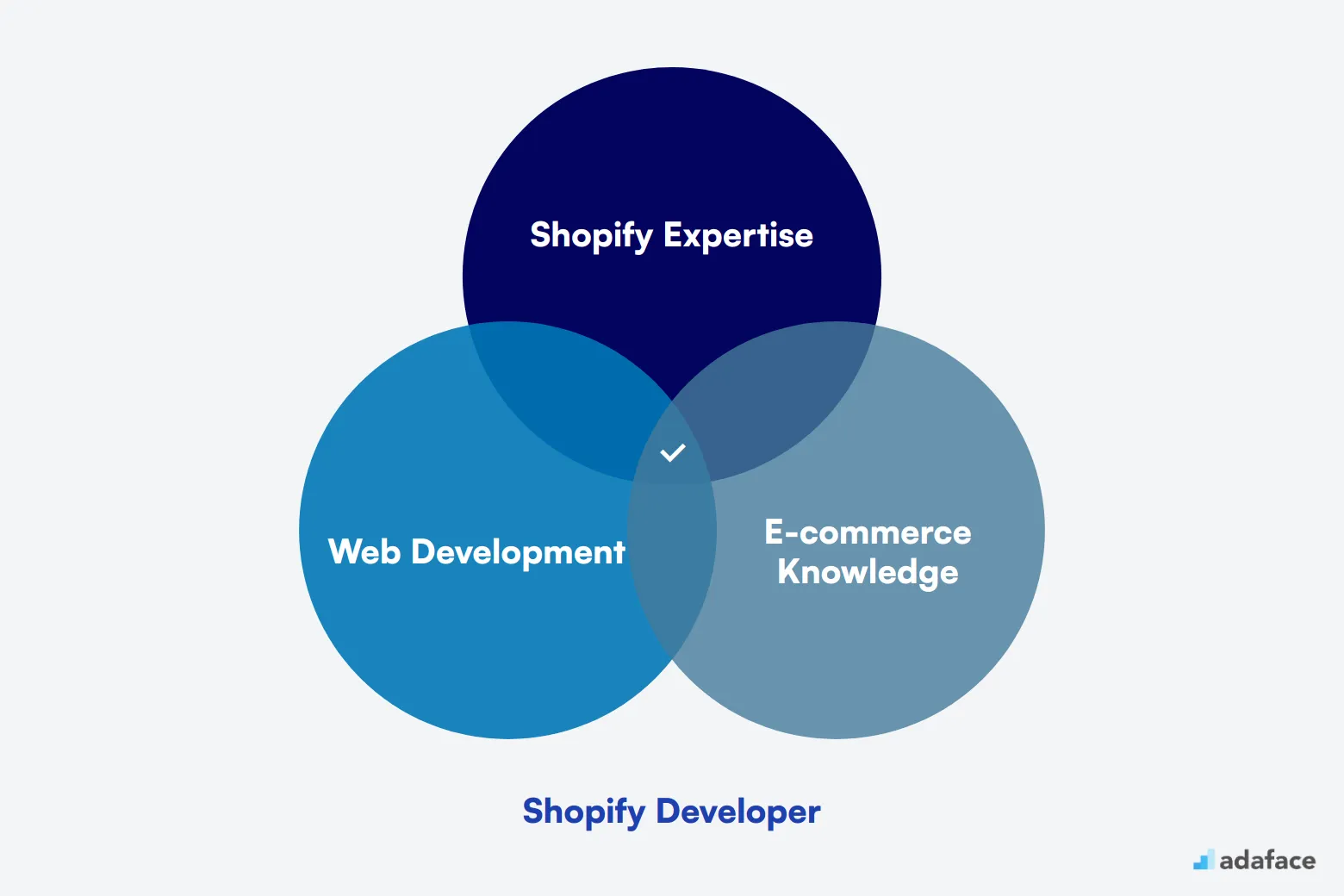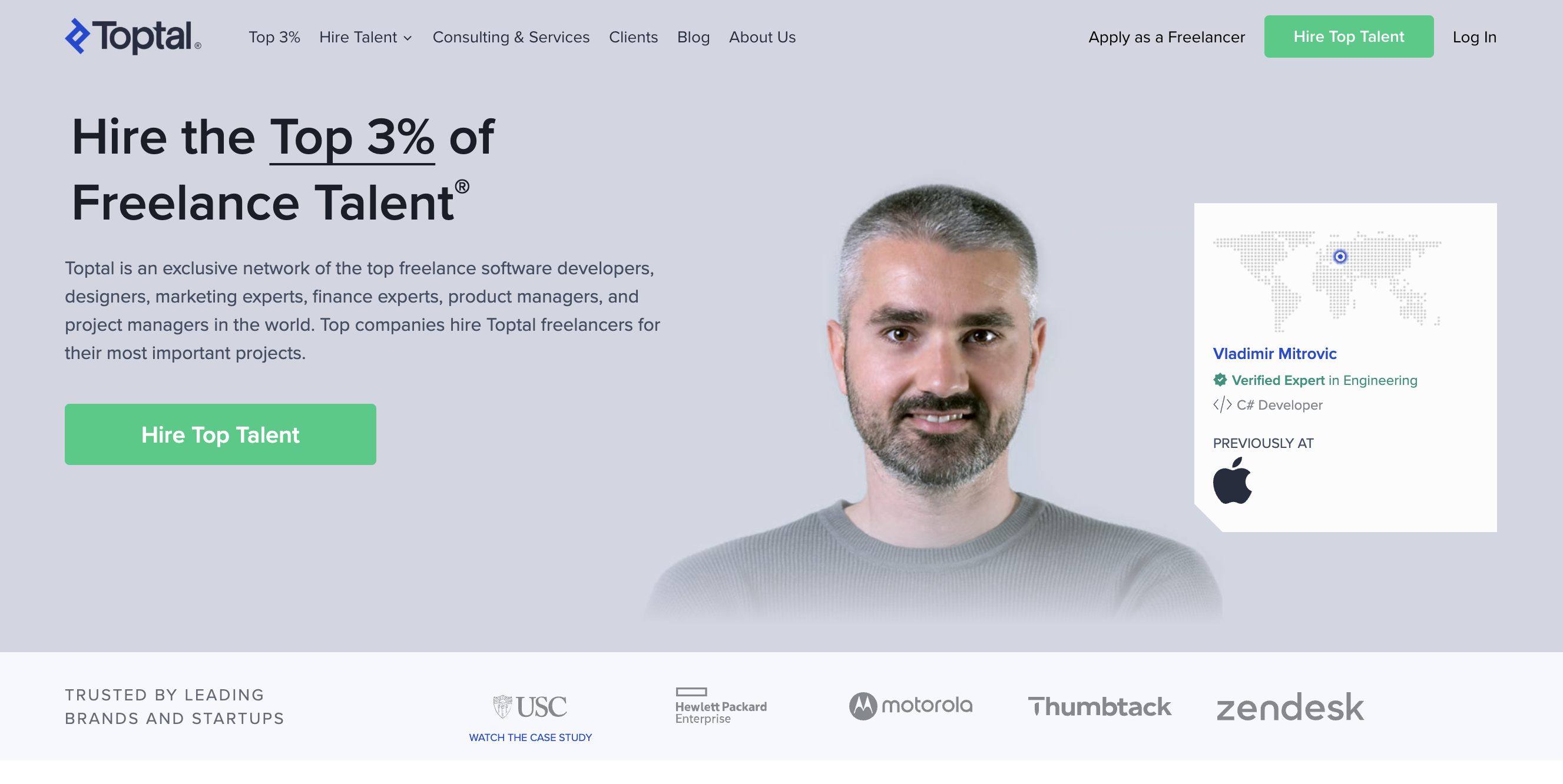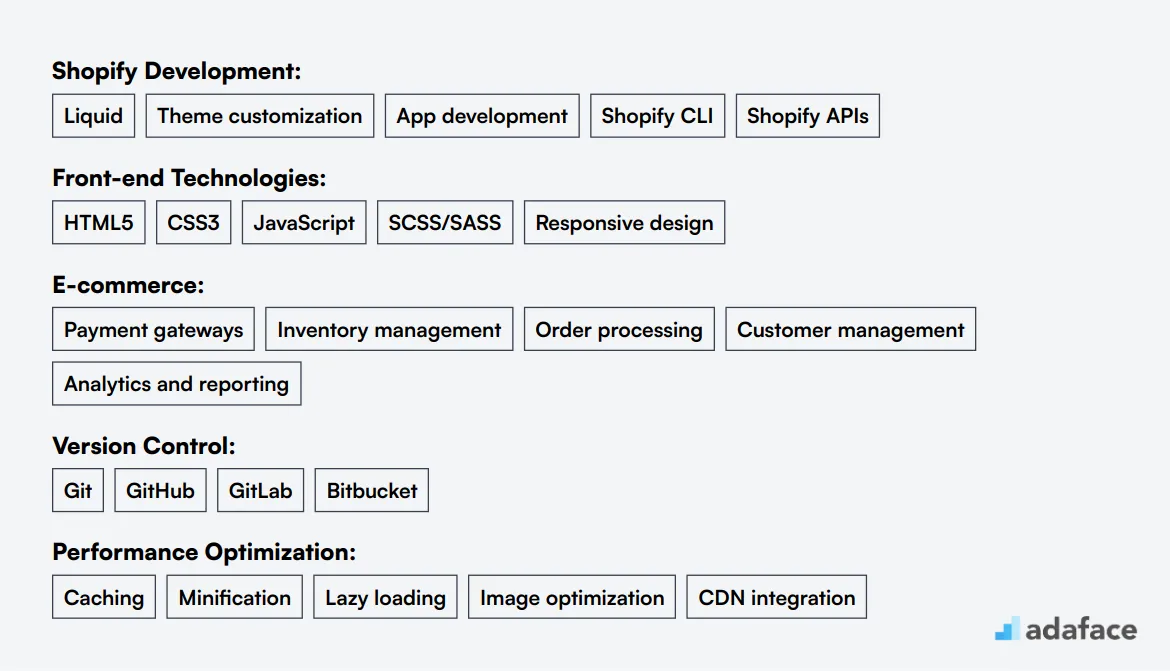In the fast-paced world of e-commerce, hiring a skilled Shopify developer can be a game-changer for your business. As a recruiter, finding a developer who can seamlessly integrate and optimize Shopify functionalities is critical to enhancing your online store's performance. However, many companies underestimate the complexity of the role, often overlooking the need for a developer with specific technical and soft skills. The challenge lies in identifying candidates with the right balance of technical expertise, creativity, and a good understanding of e-commerce strategies.
In this guide, we break down the role of a Shopify developer and provide insights into the skills and qualifications you should look for. We also cover the hiring process, methods to write effective job descriptions, and the best platforms to source talented developers. For more on evaluating technical talent, check out our comprehensive guide on attracting the best technical talent.
Table of contents
Why Hire a Shopify Developer?
Hiring a Shopify developer can be a game-changer for your e-commerce business. They can solve problems like slow-loading pages, custom feature integration, or mobile responsiveness issues. For example, if your store's conversion rate is lower than expected, a Shopify developer could optimize your checkout process.
Consider hiring a Shopify developer when:
- Your store needs unique features not available in standard themes
- You're planning a major redesign or migration
- You need ongoing maintenance and updates
Before committing to a full-time hire, assess your project scope and timeline. For short-term needs or specific projects, hiring a freelance Shopify developer might be more cost-effective. For long-term growth and continuous store improvement, bringing a developer in-house could be the best investment.

What Does a Shopify Developer Do?
A Shopify Developer creates and manages online stores using the Shopify platform. They work on customizing themes, developing apps, and integrating third-party services to enhance the functionality and user experience of e-commerce websites.
The day-to-day tasks of a Shopify Developer include:
- Customizing Shopify themes using Liquid, HTML, CSS, and JavaScript
- Developing Shopify apps to add new features to stores
- Integrating payment gateways and shipping methods
- Optimizing store performance and speed
- Troubleshooting technical issues and providing support
- Staying updated with Shopify's latest features and best practices
Shopify Developer Hiring Process
The Shopify developer hiring process typically spans 4-6 weeks. Here's a quick overview of the timeline and key steps:
- Post a well-crafted job description on relevant platforms
- Review resumes and portfolios (1-2 weeks)
- Conduct initial screenings or skill assessments (1 week)
- Schedule technical interviews (1-2 weeks)
- Evaluate cultural fit (concurrent with technical interviews)
- Make an offer to the top candidate (1 week)
This timeline can vary based on your organization's needs and the candidate pool. In the following sections, we'll dive deeper into each step, providing you with checklists and resources to streamline your Shopify developer hiring process.
Skills and qualifications to look for in a Shopify Developer
When building a candidate profile for a Shopify Developer, it's important to distinguish between must-have skills and nice-to-have qualifications. The key is to focus on the core competencies that directly impact your e-commerce projects. Here's a quick guide to help you identify the right mix of skills for your Shopify development needs.
Required skills typically include proficiency in Shopify's Liquid templating language, strong knowledge of HTML, CSS, and JavaScript, and experience with responsive web design. Familiarity with Shopify's API and app development is also crucial. Preferred skills might encompass version control systems, SEO best practices, and experience with React or Vue.js for advanced app development.
Remember, the ideal candidate should have a solid foundation in web development, coupled with specialized Shopify expertise. E-commerce knowledge is also valuable, as it helps developers understand the broader context of their work.
| Required skills and qualifications | Preferred skills and qualifications |
|---|---|
| Proficiency in Shopify's Liquid templating language | Experience with version control systems (e.g., Git) |
| Strong knowledge of HTML, CSS, and JavaScript | Knowledge of SEO best practices |
| Experience with responsive web design and cross-browser compatibility | Familiarity with headless commerce architecture |
| Familiarity with Shopify's API and app development | Experience with React or Vue.js for Shopify app development |
| Understanding of e-commerce principles and best practices | Understanding of performance optimization techniques |
How to write a Shopify Developer job description?
Once you have a candidate profile ready, the next step is to capture that information in the job description to attract the right candidates. A well-crafted job description can be the difference between landing a top Shopify Developer or missing out.
- Highlight key responsibilities and impact: Clearly outline the specific duties a Shopify Developer will perform, such as designing, implementing, and maintaining Shopify stores. Emphasizing how their work contributes to the company's success will attract motivated professionals.
- Balance technical skills with soft skills: While listing required technical skills, such as expertise in Liquid, HTML, CSS, and JavaScript, don't forget to include soft skills like communication and teamwork. A well-rounded developer who can collaborate effectively will be invaluable.
- Showcase your company and role's unique selling points: Share what makes your company and this position attractive, whether it's a commitment to innovative projects, a supportive work culture, or growth opportunities. Unique aspects can set your listing apart from others, drawing in top talent.
For more guidance, consider reviewing an example job description to ensure you're covering all bases.
Best Platforms to Hire Shopify Developers
Now that you've crafted a perfect job description for your Shopify developer role, it's time to list it on various job sites and platforms. This will help you reach a wide pool of candidates who specialize in Shopify development, ensuring you find the right match for your team's needs.
Toptal Shopify Developers
Ideal for high-quality freelance Shopify developers. Rigorous vetting process ensures top 3% of talent. Suitable for complex, short-term projects or ongoing development needs.

Upwork Shopify Developers
Great for a wide range of Shopify development needs. Offers flexibility in terms of budget and project scope. Suitable for both small tasks and larger projects.

LinkedIn Shopify Developer Jobs
Excellent for finding full-time Shopify developers. Allows direct connection with candidates and provides detailed professional backgrounds. Ideal for building long-term teams.

The remaining platforms provide diverse options based on your needs. LinkedIn is ideal for connecting with full-time professionals and offers a great insight into their backgrounds. Indeed and Dice are excellent for finding a wide array of full-time candidates, especially those with a strong technical foundation. For startups, AngelList provides a platform to attract innovative talent, while We Work Remotely caters to those looking for remote opportunities. Freelancer and Fiverr offer flexibility and are great for project-based work with options for varying budgets and expertise levels. For those seeking a range of skills, Guru provides developers for both short and long-term projects. To attract top technical talent, consider using coding tests for hiring to assess the skills of potential candidates.
Keywords to Look for in Shopify Developer Resumes
Resume screening helps you quickly identify promising Shopify developer candidates from a large applicant pool. It's a time-saving first step in your hiring process.

When manually screening resumes, focus on key Shopify skills like Liquid templating, theme customization, and app development. Look for experience with front-end technologies like HTML, CSS, and JavaScript, as well as e-commerce knowledge.
AI tools can streamline resume screening. You can use ChatGPT or similar AI with a custom prompt to analyze resumes based on your specific Shopify developer requirements.
Here's a sample prompt for AI-powered Shopify developer resume screening:
TASK: Screen resumes for Shopify developer role
INPUT: Resumes
OUTPUT: For each resume, provide:
- Email
- Name
- Matching keywords
- Score (0-10 based on keyword matches)
- Recommendation
- Shortlist (Yes/No/Maybe)
RULES:
- Use 'Maybe' if unsure about fit
- Keep recommendations brief
KEYWORDS:
- Shopify (Liquid, Theme customization, App development)
- Front-end (HTML, CSS, JavaScript, Responsive design)
- E-commerce (Payment gateways, Inventory management)
- Version control (Git)
- Performance optimization
Customize this prompt based on your specific Shopify developer job requirements.
Recommended Skills Tests for Assessing Shopify Developers
Skills tests are a reliable way to evaluate Shopify developers' abilities beyond their resumes. They provide objective insights into a candidate's technical proficiency and problem-solving skills. Here are the top tests we recommend for assessing Shopify developers:
Web Developer Test: This web developer online test evaluates fundamental web development skills. It assesses a candidate's knowledge of HTML, CSS, and JavaScript, which are essential for customizing Shopify themes and building storefronts.
JavaScript Test: A JavaScript online test is crucial for evaluating a developer's ability to create interactive elements and custom functionality in Shopify stores. It measures proficiency in core JavaScript concepts and modern ES6+ features.
PHP Test: While Shopify uses its own templating language (Liquid), many developers use PHP for custom app development. A PHP Laravel test can help assess a candidate's server-side programming skills, which are valuable for creating Shopify apps and integrations.
Full Stack Developer Test: A full stack developer test is useful for evaluating candidates who will work on both front-end and back-end aspects of Shopify development. It assesses a wide range of skills needed for comprehensive store customization and app development.
E-commerce Analytics Test: An e-commerce analytics test can help identify developers who understand the broader context of online retail. This knowledge is valuable for optimizing Shopify stores and implementing data-driven features to boost sales and user experience.
Structuring the Interview Stage for Hiring Shopify Developers
Once candidates have passed the initial skills tests, the next step is the technical interview where their hard skills are assessed. Skills tests are effective for filtering out unqualified applicants, but the technical interview helps identify the best fit for the role. This stage is crucial for evaluating candidates’ problem-solving abilities and practical experience, particularly with Shopify development.
Here are some sample interview questions to consider for a Shopify Developer role: What experience do you have with Shopify Liquid template language? This question assesses familiarity with Shopify’s templating engine. How do you optimize a Shopify store's performance? Knowing how to improve load times and user experience is key. Describe a challenge you faced with Shopify and how you overcame it. This probes problem-solving skills. What integrations have you implemented on Shopify platforms? This checks understanding of third-party app integrations. Explain the process of customizing a Shopify theme. Understanding this aspect showcases ability to tailor the platform to client needs. For more on technical interview preparation, see our Shopify Developer Interview Questions.
What's the difference between a Shopify Frontend Developer and a Shopify Backend Developer?
Many people mix up Shopify Frontend Developers with Shopify Backend Developers, as they both play important roles in building a Shopify store. However, their responsibilities and expertise are quite different. Understanding these differences can help recruiters and hiring managers find the right fit for their team.
A Shopify Frontend Developer focuses on the user interface and experience, breathing life into the website's visual elements. They work primarily with technologies like HTML, CSS, JavaScript, and Liquid to customize themes and implement UI/UX designs. Their key performance indicators include page load speed and user engagement, and they commonly collaborate with designers and UX researchers.
On the other hand, a Shopify Backend Developer is tasked with handling server-side logic and database management. They use technologies such as Ruby on Rails, GraphQL, and REST APIs to develop apps, integrations, and manage data. They focus on metrics like API response time and server uptime, often collaborating with system architects and database administrators. For those interested in exploring skills further, our post on skills required for Shopify developers offers deeper insights.
| Shopify Frontend Developer | Shopify Backend Developer | |
|---|---|---|
| Primary Focus | User interface and experience | Server-side logic and database management |
| Key Technologies | HTML, CSS, JavaScript, Liquid | Ruby on Rails, GraphQL, REST APIs |
| Typical Tasks | Theme customization, UI/UX implementation | App development, integration, data management |
| Required Skills | Design sensibility, responsive design | Database design, server optimization |
| Performance Metrics | Page load speed, user engagement | API response time, server uptime |
| Tools | Theme Kit, Shopify CLI | Shopify App CLI, Webhooks |
| Collaboration | Designers, UX researchers | System architects, database administrators |
| Security Focus | Cross-site scripting prevention | Data encryption, authentication protocols |
What are the ranks of Shopify Developers?
Understanding the different ranks of Shopify developers can be confusing, especially as the titles can vary across companies. However, recognizing these distinctions helps in hiring the right talent for your team.
• Junior Shopify Developer: This is an entry-level position where the developer has basic knowledge of Shopify and its features. They often assist with simple tasks, such as setting up themes and modifying existing templates under guidance.
• Shopify Developer: This mid-level role typically involves a few years of experience. A Shopify developer is expected to handle more complex projects, such as building custom apps and integrating third-party services, while demonstrating a solid understanding of Liquid, Shopify's templating language.
• Senior Shopify Developer: A senior developer has extensive experience and a strong portfolio of successful Shopify projects. They lead development initiatives, mentor junior staff, and have a deep understanding of the platform's architecture and best practices.
• Shopify Development Team Lead: This role involves overseeing a team of developers, ensuring projects are delivered on time and meet quality standards. The team lead coordinates with other departments and is often responsible for strategic decisions regarding the technological direction of Shopify initiatives.
Hire the Best Shopify Developers for Your Team
To wrap up our discussion on hiring the right Shopify developers, we've covered everything from understanding their role and writing effective job descriptions to identifying the necessary skills and qualifications. We've also discussed the importance of structuring the interview process to ensure you select the best candidates.
If there's one takeaway from this guide, it's the importance of using accurate job descriptions and skills tests to streamline your hiring process. Implementing relevant assessments, such as a Shopify test or a web developer online test, can help you make informed decisions. Remember, the right testing approach can significantly enhance your ability to hire top talent for your team.
Shopify Developer Test
FAQs
Hiring a Shopify developer can significantly improve your online store's functionality, user experience, and overall performance, which can lead to increased sales and customer satisfaction.
Look for skills such as proficiency in Shopify's platform, HTML/CSS, JavaScript, understanding of e-commerce best practices, problem-solving abilities, and effective communication.
A good job description should outline the key responsibilities, required skills, and qualifications. It should also highlight your company’s values and what candidates can expect from the role.
You can find Shopify developers on various platforms like freelance websites, job boards, and specialized tech recruitment agencies. Platforms like LinkedIn and GitHub are also helpful.
Use skills assessments and technical interviews to evaluate a candidate's ability to work with Shopify. Online assessments can be particularly useful in gauging technical prowess.
A frontend developer focuses on the user interface and experience, while a backend developer focuses on server-side logic and database management. Both roles are crucial for a well-functioning e-commerce site.
A standout Shopify developer not only has technical expertise but also possesses creativity, problem-solving skills, and a strong understanding of e-commerce trends.

40 min skill tests.
No trick questions.
Accurate shortlisting.
We make it easy for you to find the best candidates in your pipeline with a 40 min skills test.
Try for freeRelated posts
Free resources



